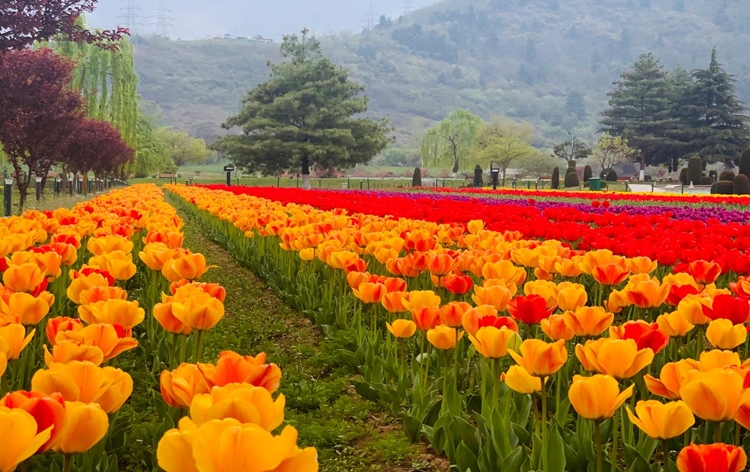
Kashmir’s Tulip Garden Recognized as Asia’s Largest by World Book of Records
Kashmir’s Tulip Garden: A Blooming Wonder Recognized Globally
Nestled amidst the serene beauty of the Zabarwan mountain range, at an impressive altitude of 5,600 feet, lies Srinagar’s magnificent Tulip Garden. This natural marvel, cradled on the foothills of the Zabarwan range and overlooking the picturesque Dal Lake in Siraj Bagh, is not merely a garden; it’s an enchanting canvas painted with a riot of colors, a mesmerizing spectacle that has captivated hearts worldwide. But the tale of this garden goes beyond its inherent beauty; it’s a story of recognition, accolades, and a place in the annals of the World Book of Records.
The genesis of the Kashmir Tulip Garden traces back to the artistic vision of the then Chief Minister of Jammu and Kashmir, Ghulam Mohammad Sadiq, who envisaged a garden that would rival the iconic gardens of the Mughal era. In 2007, this vision manifested into reality with the establishment of the Indira Gandhi Memorial Tulip Garden. Located at the foothills of the majestic Zabarwan Range and overlooking the serene Dal Lake, the garden boasts a scenic vista that complements the vibrant colors of its blooming tulips.
The Tulip Festival, held annually in Srinagar, is a celebration of nature’s unparalleled artistry. This grand event usually takes place during the onset of spring, when the valley awakens from its winter slumber with an explosion of colors. The festival serves as a captivating platform to showcase not only the beauty of the tulips but also the rich cultural heritage of Kashmir. It draws visitors from across the globe who flock to witness the captivating spectacle of millions of tulips in full bloom.
Also Read | Best Places for Destination Wedding in Kashmir
Walking through the Kashmir Tulip Garden during the Tulip Festival is akin to stepping into a dream. The meticulously landscaped garden comes alive with an astounding array of tulips, forming a mesmerizing mosaic of colors and patterns. From vibrant reds and dazzling yellows to serene whites and deep purples, the garden becomes a canvas on which nature unveils its most splendid artwork.
Tulips hold a special place in the hearts of Kashmiris. Apart from being a visual spectacle, these flowers carry a profound cultural significance. Tulips symbolize love, beauty, and eternal life—a reflection of the enduring spirit of the Kashmiri people who have weathered various challenges throughout history. The Tulip Festival, thus, becomes a celebration of the indomitable human spirit and the resilient beauty of nature.
Today, the Kashmir Tulip Garden stands as one of the most celebrated attractions in the region, attracting both national and international tourists. Its fame has transcended geographical boundaries, earning it accolades and recognition on a global scale. The garden’s beauty is not only a visual delight but also a representation of the region’s commitment to preserving its natural heritage.
Also Read | Naranag: Exploring the Rich History, Enchanting Scenery, and Trekking Paradise of Kashmir
A Place of Superlatives: Asia’s Largest Tulip Garden
Kashmir’s Tulip Garden stands tall as a symbol of nature’s magnificence, boasting an impressive feat that has earned it a place in history. It is none other than Asia’s largest Tulip Garden, a title that brings immense pride to the region. This vibrant sanctuary is home to a staggering 1.6 million tulip plants, representing a staggering array of 68 different varieties. Here, nature has crafted a tapestry of colors that stretches as far as the eye can see, a testament to the breathtaking diversity of tulips that grace this garden.
A Global Recognition by the World Book of Records
The significance of this horticultural masterpiece reached far beyond the valley’s boundaries. The World Book of Records, a prestigious international body that acknowledges exceptional achievements and records, took note of the grandeur of Kashmir’s Tulip Garden. In a moment of immense pride and honor, a certificate affirming its status as Asia’s largest Tulip Garden was bestowed upon Sheikh Fayaz Ahmad, the Commissioner Secretary to the Government of Jammu and Kashmir, responsible for the Floriculture, Gardens, and Parks Department.
A Dedication to Unsung Heroes: The Gardeners
In a heartwarming gesture, Sheikh Fayaz Ahmad dedicated this prestigious award to the silent heroes who toil tirelessly behind the scenes—the diligent and devoted gardeners of the department. Their unwavering commitment to nurturing this living canvas has been instrumental in transforming the Tulip Garden into a global wonder.
Also Read | Exploring North Kashmir’s LoC Proximity: Tourist Hotspots in Keran, Gurez, Tangdhar, Machil, and Bangus
A Grateful Acknowledgment
Expressing gratitude and appreciation, Sheikh Fayaz Ahmad extended his thanks to the World Book of Records, London. This recognition, a testament to the tireless efforts and meticulous care invested in the Tulip Garden, has reaffirmed its status as an extraordinary natural wonder.
Bottemline, Kashmir’s Tulip Garden, recognized as Asia’s largest Tulip Garden by the World Book of Records, is a mesmerizing testament to nature’s artistic prowess. With its 1.6 million tulip plants, spanning an astonishing 68 varieties, this enchanting garden has etched its name in the annals of horticultural history. Sheikh Fayaz Ahmad’s dedication of this award to the diligent gardeners underscores their indispensable role in nurturing this magnificent masterpiece. As this garden continues to bloom and inspire, it stands as a living testament to the harmony between human effort and nature’s breathtaking beauty.
Also Read | Kashmir’s stunning landscapes make It a Top Destination for Weddings
